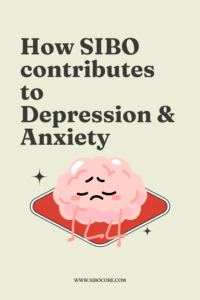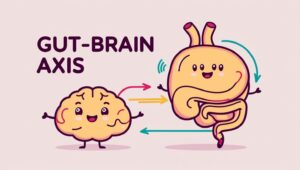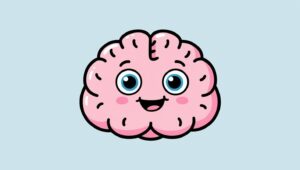How big is the chance you are suffering from both anxiety/depression and gut problems? You might think they’re not related since they’re quite far away, as far as bodies go at least. But that is untrue. Your gut health may very well be influencing your mental health. The connection between Small Intestinal Bacterial Overgrowth (SIBO), depression, and anxiety is a growing focus in both medical and wellness communities. Studies show that depression and SIBO co-occur regularly (1, 2). This is mostly due to the gut-brain axis.
Already in this study in 2005, they’re discussing the relationship between depression and SIBO (3). In this post, I’ll walk you through why this is a big deal.
What Is SIBO and Why Does It Matter?
First things first, what is SIBO? Small Intestinal Bacterial Overgrowth (SIBO) is a condition where an abnormally large number of bacteria live in the small intestine. Unlike the beneficial bacteria found in the large intestines, these same microbes in the small intestines can disrupt digestion, leading to symptoms such as bloating, diarrhea, abdominal pain, and malnutrition.
SIBO matters because it not only impacts physical health but also has significant implications for mental well-being. Research reveals that SIBO is often co-occuring with IBS (4), which doesn’t help, because many people suffer from SIBO without realizing it, often mistaking it for example with IBS. That includes doctors as well.

The Gut-Brain Axis: A Two-Way Street
The brain and gut are in constant communication, working together in ways that affect everything from digestion to mood and behavior. This connection helps us sense things like nausea, feeling full, or even pain. On the flip side, stress can disrupt how the gut works, changing things like digestion and gut movement. What’s important to understand is that this is really a two-way street: signals go both ways, which is why you may make decisions based on a gut feeling, but also feel bad in your gut after a particularly stressful time.

Scientists are now looking more closely at how this two-way communication—along with changes in gut bacteria—might impact our health. It starts with signals from the gut, which can be turned into messages for the brain using nerves, hormones, or the immune system. These signals can work on their own or team up to influence the central nervous system (9).
Key components of the gut-brain axis include:
- The Vagus Nerve: A primary pathway that sends signals between the gut and brain.

- Hormones and Neurotransmitters: Chemicals like serotonin, produced in the gut, play a significant role in mood regulation.
- Immune System: Gut health influences immune responses, which can impact brain function.
Research has shown that an imbalance in gut bacteria can lead to alterations in mood and behavior. For instance, certain gut microbes are involved in producing GABA, a neurotransmitter that helps control feelings of fear and anxiety. Disruptions in this process can contribute to mental health disorders (10). SIBO is not just a bacterial overgrowth, it’s also an imbalance of the bacteria in the gut. I for example, had not only an overgrowth in my Small Intestine, but a large shortage in my large intestine: of both good and bad bacteria!
How SIBO Contributes to Depression and Anxiety
SIBO can play a significant role in the development or worsening of depression and anxiety through several mechanisms in this gut brain axis:
Serotonin Production
Emotional distress is often linked to neurotransmitter imbalances. Approximately 90% of serotonin is produced in the gut. (6). Certain bacteria in the gut, such as Streptococcus spp., Enterococcus spp., Escherichia spp., Lactobacillus plantarum, Klebsiella pneumoniae, and Morganella morganii, can produce serotonin. Overgrowth of harmful bacteria can reduce serotonin levels, which can affect mood and emotional well-being. In other words: the imbalance of good versus bad bacteria in your gut (dysbiosis) could be the reasons for less serotonin.
Hormonal Changes
Changes in the gut microbiome can lead to depressive disorders due to hormonal changes as well (8).
Inflammation
Additionally, the inflammation caused by SIBO can cross the blood-brain barrier, triggering neuroinflammation—a common factor in mental health conditions. Studies show that individuals with SIBO are more likely to experience brain fog, mood swings, and a reduced ability to cope with stress. (7).
Nutrient Deficiencies
SIBO can lead to deficiencies in essential nutrients like B vitamins and magnesium. Already in 2005, a study explains how SIBO and depression can also impact each other physically. This is because SIBO negatively impacts the absorption of key nutrients like fats, carbs, B vitamins among others. These nutrients are crucial for neurotransmitter production and overall brain health. Moreover, when nutrient levels drop, it can make it harder for the body to fight off SIBO, which creates a vicious cycle. The authors even note their fascination with how treating SIBO has shown to improve not just digestive issues but also symptoms like depression, memory problems, and poor concentration. (3).

Common Symptoms of Depression, Anxiety, and SIBO
The symptoms of SIBO, depression, and anxiety often overlap, making it challenging to pinpoint the root cause. Common shared symptoms include:
- Fatigue
- Brain fog
- Sleep disturbances
- Digestive discomfort
- Chronic pain
- Mood swings
Identifying these symptoms and their triggers is crucial for effective treatment. Working with a healthcare professional, such as a functional doctor, can help uncover whether gut health issues like SIBO are contributing to mental health challenges.
Conclusion
So, what does all this mean? The connection between your gut and brain is undeniable and the scientific community is just starting to catch up on it. By taking care of your gut health, symptoms you didn’t think were related could be resolved. For myself, I felt much much better after solving SIBO. Not only did I have less bloating and cramping, my skin got clearer, as well as my brain. I felt energetic and way less fearful, whereas before I felt ‘under attack’ every single moment of the day. I could never explain it, but that is what it felt like and it just went away. So don’t dismiss mental health and the SIBO connection, the gut-brain axis is important!

